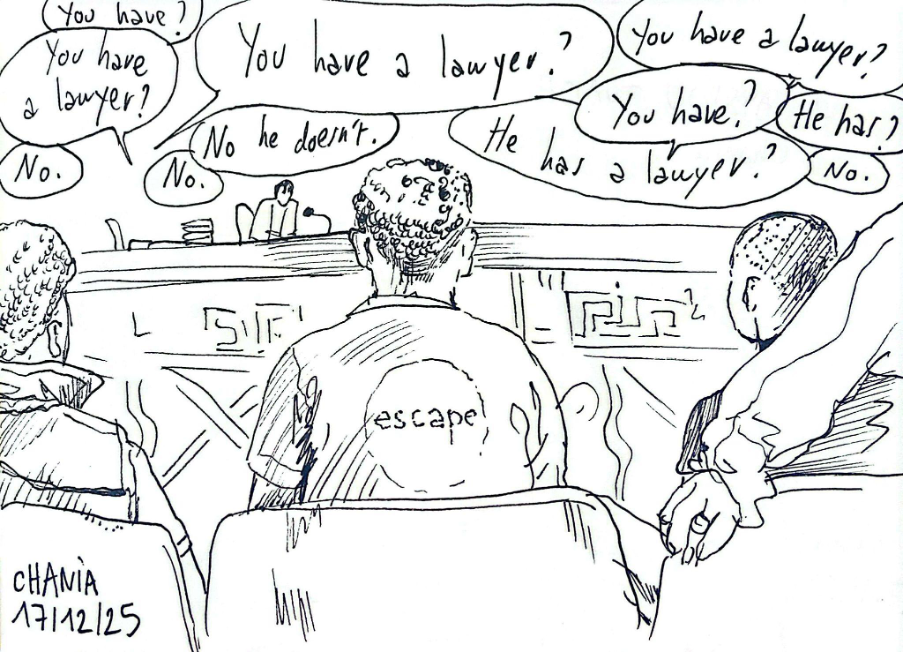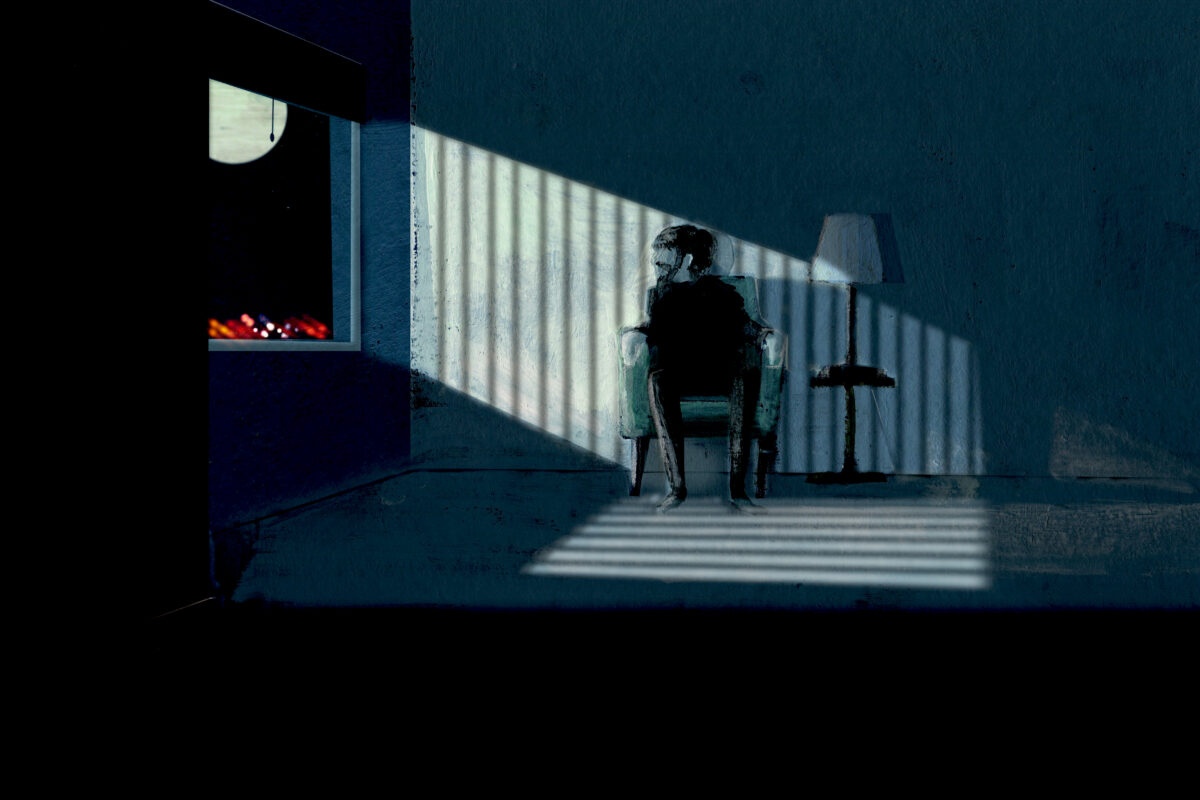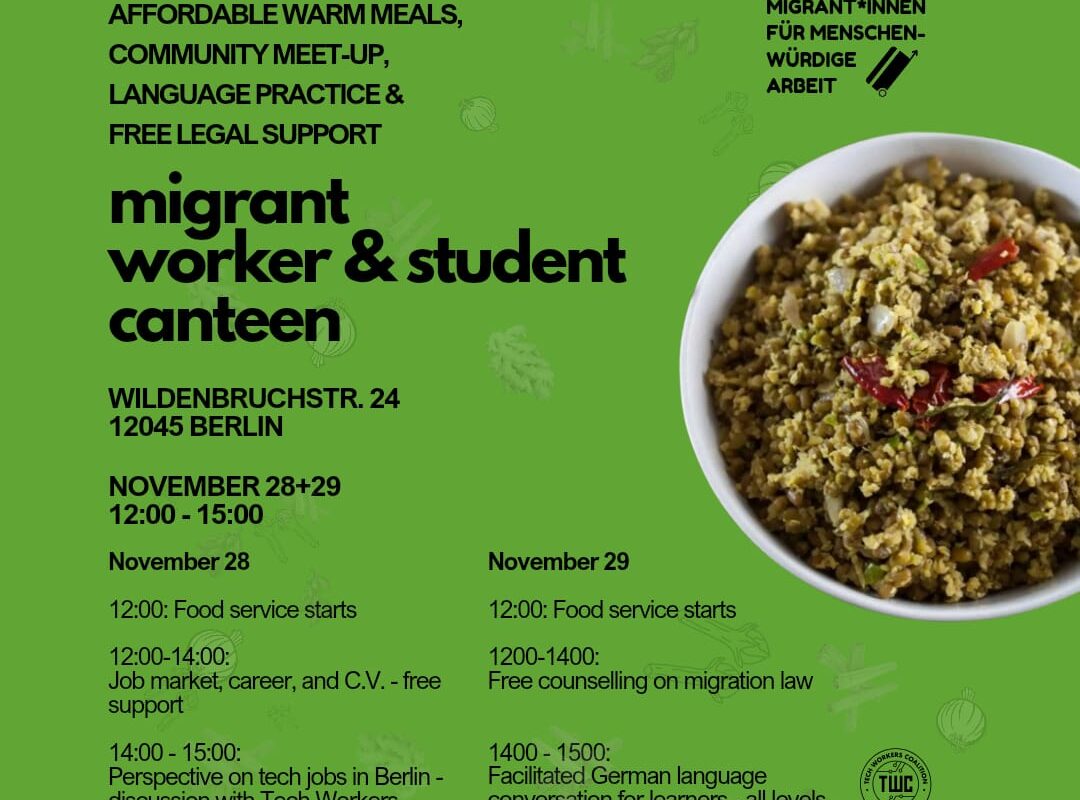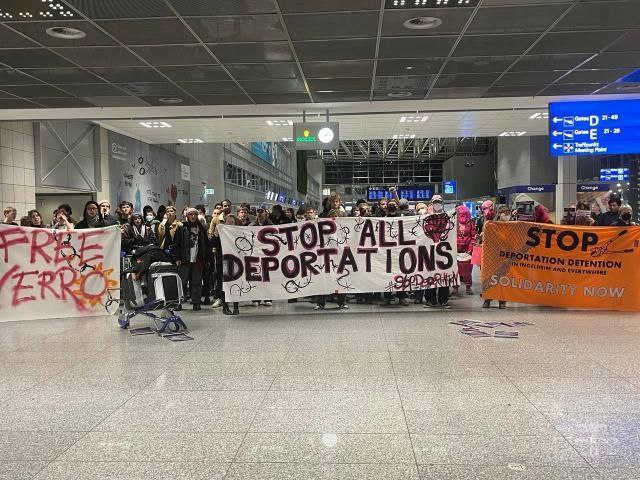We arrived in Mytilene, the capital of the island of Lesvos, on September 19. It was already a week since the outbreak of the fire. The new concentration camp had been set up. There were ongoing government threats and intimidation of refugees in order to force them to enter the camp. Thousands were in tents and huts on the sidewalk of the camp Kara Tepe, while many were still living in the burned Moria. A rally was planned in the afternoon of the same day, called by the Labor Center of Lesvos and the prefectural department of ADEDY (civil servants union), in solidarity with the refugees and against the establishment of a new settlement.
We spent the morning visiting Moria. It was impossible to see inside the camp that had detained up to 20,000 people. From the outside, where the huge shantytown was situated, all that could be seen were carcasses of containers, burnt tents, and shacks. But one couldn’t say that the area had been deserted. Hundreds of people were trying to save whatever they could of their belongings, ridding them of ashes and loading them into crates. Then they carried them downhill to Kara Tepe. Others formed queues, following the invitation of an NGO that was already distributing basic necessities. Elsewhere, volunteers from the social kitchen “The other person” set up vats of food. At one spot on the street, some men washed themselves with a broken water pipe.
And at several places, tents were set up again. “We are a family of six,” says A. from Afghanistan, who lives in one of them. Next to him, his smiling children signal the victory to me. “We had to escape to Europe because the Taliban had attacked me in Afghanistan. My back is damaged”, he tells us and shows us a wound. “The night of the fire the police did not tell us anything. When we realized what was happening, we left our tent and ran to save ourselves. We do not want the new camp. In the new camp one can hardly find the necessary needs. I’m not so much worried about myself as about my children.”
We show him a copy of the weekly anti-capitalist newspaper “Ergatiki Allileggyi” (Labor Solidarity) and translate it for him. He replies, “We are all human, religions do not matter. We all want a good life for our children” and a friend of his who is listening asks to speak with us. His hand was bandaged. “Look at my hand! The police broke it,” he tells us. A little further down, next to the asphalt road, another group is sitting next to three tents. They agree to talk to me. The discussion is about the new camp. “It’s a prison,” they tell us. “It is said that they even take the laces from your shoes. We did not like Moria, but this is even worse.”

The next day we visited the camp Kara Tepe. The area is blocked. The fascist blocs are no longer there. The only ones left are those of the special forces/MAT. We manage to pass through the last one, at the area next to the new camp. Thousands of refugees have set up tents and shacks made of wood and sails on both sides of the street. In the middle of the road, people queued for hundreds of meters, patiently waiting for the food offered by some NGOs. In some places, families prepare their own food in a small pan on a stove. In another place, next to a broken pipe, a mother and her two little kids are washing their clothes in a pot. An elderly man and a child are filling bottles with water. The parking lots of a nearby supermarket have been transformed into an entire neighborhood. Kids play with whatever they can find and fashion as toys. A girl has made a swing with a thick rope. We meet Mohammad. He holds his one-month-old baby in his arms and complains that a few days ago the police threw chemicals right next to where he was sitting with the child.
On the opposite sidewalk we see a tent with a placard on. We read in English: “We were displaced due to the fire on 8/9. Since then, my pregnant wife and I have been living in the streets. We want to go to mainland Greece. Where are our human rights?” The woman sitting at the entrance of the tent has next to her an album of photos from Afghanistan, which make anyone understand completely what led them to the refugee path. She agrees to tell us her story:
My name is Mariam and I have been here for 11 months. I came from Afghanistan. We left Afghanistan because we were in danger. Our house was bombed. Two of my husband’s brothers were killed. His mother became deaf from the explosion. It was a very difficult journey. First we went to Iran, Turkey, and then here. From then until the fire burst, we lived in Moria.
One month ago I went through the asylum interview. Now I am waiting for the papers in order to leave. The fire destroyed everything. The night of the fire was very bad. We were in serious danger. We were the last to leave Moria. Now we are told that if we refuse to go to the new camp, our asylum case will be aborted. We decided to go to camp. It‘s a blackmail. I do not want to go there. We hear that the conditions inside are not good. There are no toilets, the tents are not safe, etc. In Moria we could at least go out. We are told that we will not be allowed out of here. That this is a closed camp. We are afraid to go in there. But we decided to do so because we have no other choice. I am six months pregnant. Staying on a sidewalk is not okay if you are pregnant. We hope there are at least health facilities there.
We left Afghanistan for a safer life. But we have not found it here. Not only us, this is the case for all the refugees. We do not want to go to another country. We want to go to a safe place in mainland Greece. There have been protests here in the last days. We do not want another Moria. Every human wants to live a good and safe life. This is not the case here. In Moria one person was killed every night. The police treat us very badly. The night when half of Moria burned down, the police were telling us “Do not leave Moria, we will save you”. We said OK. The next night the remaining half was burned. We had no choice but to leave. On Saturday, people took to the streets shouting “We want freedom.” The police threw chemicals at us. They threw chemicals on our tent and the neighboring tents.
The next morning, the government intensified its efforts to fill the new camp. This meant new attacks by the police, after having expelled the media and NGOs from the area. Thousands began to concentrate at the entrance of the camp to escape police violence, but also for the reasons that Mariam explains above. In less than three days the government was boasting that 10,000 refugees had entered the camp and a new chapter of shame for Fortress Europe had begun to be written.

No to prisons for refugees
On the nights of Tuesday September 8 and Wednesday September 9, the Moria refugee camp and the favela (shanty town) reaching the forest around the camp were destroyed by a huge fire.
More than 13,000 refugees came face-to-face with the danger of fire, but also with the hope that the hell of Moria would now become a thing of the past.
But the government made their inhumane treatment even worse. They took the opportunity to promote the creation of a new Moria, even worse than the old one. The construction of the closed camp, a refugee prison, was planned from the beginning of the year. In the spring, the government suffered a major defeat on this issue. Despite dispatching numerous police forces on the island, the construction of the camp in Karava was blocked by the mass mobilization of the inhabitants of Lesvos and a strike by the unions which lasted several days.
This time it is not in Karava, but at the army shooting range, a few meters from the place where the refugees were detained in Kara Tepe. It is a large barren field by the sea, exposed to the scorching sun in the summer and the raging wind in the winter. In no time, tents were set up, barbed wire was raised, a separate police headquarters was established, and within a week, the prison was ready.
At the end of the week, the government celebrated that nearly all the refugees entered the camp “at their own will.” In fact, they played the dirtiest game: They forced them into the concentration camp by making their everyday life an unbearable nightmare. They intimidated them, asserting that anyone who did not enter the camp would be excluded from any asylum procedure. And they proceeded to refugee arrests, charging them for the arson of Moria.
The charges did not stop even after the refugees began entering the new prison. A Guantanamo set up on dirt and stones, ready to become a huge swamp with the first rain. There are 35 chemical toilets for thousands of people. More than 100 people are squeezed in every one of the dilapidated and floorless tents. There is no running water. It is situated in an old shooting range, where children play with bullet shells and the debris of military exercises. The food is horrible and NGOs or other organization are banned from providing food.
And minister Mitarakis states in Orwellian fashion that the setting of the new prison was a humanitarian duty.

It has been five years have since 2015, when we had the first massive arrivals of refugees and immigrants in Lesvos, when the first solidarity networks were developed spontaneously. These five years feel like a century.
Policies like the EU-Turkey agreement and the overall playing of the racist card by governments and local politicians and their fascist rhetoric have bred the deep state in our country. The failure to deliver justice for a series of verbal and/or physical attacks against refugees, with the typical example of the non-conviction of those responsible for the pogrom of the 22nd of April 2018 and the attacks against NGO workers in February 2020, brings impunity for criminal acts, empowering the murderous cooperation between paramilitary groups and the state.
We – and the answer of the workers/unemployed comes through their unions and all kinds of anti-fascist, anti-racist initiatives -, call the people of Lesvos to turn a deaf ear to the fascist yells, to build networks of solidarity not only with the refugees, but also in their neighborhoods. To prevent the creation of detention centers on our island and anywhere throughout the country.
Costas Dourakis, member of ELME (Teachers union) Lesvos Solidarity movement

A hard tug of war has been set up in Lesvos. On the one side, the government maneuvers for a new, worse Moria. The fascists are close on its side, having the backing of the regional authorities and the police. On the other side are the anti-racist movement and trade unions.
A great response was given by the motorcycle protest in the afternoon of Monday 14/9 and the labor rally organized on Tuesday 15/9 by the Labor Center of Lesvos and the prefectural department of ADEDY. Hundreds gathered at Sapfo square.
In addition to the unions, there was participation by the Federation of Agricultural Associations, the Mantamadou Struggle Committee, KEERFA Lesvos, members of PAME and Laiki Syspirosi, the municipal movement supported by SYRIZA, etc. “Neither closed nor open, the islands don’t want concentration camps” was the main slogan, accompanied by anti-fascist slogans. “No to the concentration camps, actual solidarity with the refugees, for their freedom of movement, for support of the public hospital and for widespread coronavirus tests” were the main demands expressed by the call of the unions.
“Today we witness many people participating in the rally,” says Michalis Tsorbatzoglou, a member of the local ELME and KEERFA Lesvos. “The consequent demands of the solidarity movement and ourselves of KEERFA are against the concentration camps. We support the right of refugees to move to inland Greece, to be granted papers, asylum and housing, whether they wish to go to another country or stay in Greece. The struggle must continue with the unions on the front line. As KEERFA of Lesvos, we welcome today’s rally and call on the unions to escalate the struggle with a strike all over Lesvos.”
Next to him, Abdul, a refugee participating in the rally, added: “The government should stop ignoring the needs of the refugees. We are here to stop this policy. ”

Stefanos, from the Mantamadou Struggle Committee, reminds that the movement in Lesvos has fresh memories from the battle it fought against the MAT last spring, in order not to build a concentration camp in Karava. The unions had played a decisive role then, bringing to a halt everything by the strike they had called for.
“We fought the battle in Karava last February. The issue is not finished yet. Immigrants and refugees are trapped. The government is abandoning them here in inhumane conditions and now that winter is coming, things will get worse for these people. They are going to put them in a new settlement which is actually a- prison. We will continue the battle to not let the extreme right-wing elements take over the place,” he told a reporter for Ergatiki Allileggyi.
A delegation of KEERFA-Athens participated in the rally as well.
“We are in Sappho Square to send a message to minister Chrysochoidis and prime minister Mitsotakis that after the fire in Moria, for which we hold responsible the racist policy of the government, we will not tolerate new closed camps,” emphasizes Petros Konstantinou, coordinator of KEERFA Athens. “We will not tolerate the detention in Kara Tepe. The only solution is for the refugees to move inland, to come to hotels and houses in our neighborhoods in Athens and other cities. Put an end to racist policies and stop the cries for deportations. If we have to deport someone, it should be [prime minister] Mitsotakis, because for us, refugees are welcome.”

The workers’ mobilizations did not stop at Tuesday’s rally. On Monday 21/9, a work stoppage took place by the employees of the NGOs active in Lesvos. For thousands of employees in the field, the fire in Moria meant the scrapping of their labor rights as they were called to work “due to emergency conditions” without a work-time schedule and without means of protection, and in several cases targeted by fascists.
Nevertheless, they clarify that they do not consent to the closed camp solution. “For our part, as grassroots working people, we will not accept under any circumstances to become either the managers of the state crisis, or the humanitarian alibi of repressive operations against immigrants and refugees. We will not consent to further deterioration of our working conditions. We will not cooperate with national and transnational blackmailing. We will not work for the consolidation and legalization of any camp. We stand by the struggles of trapped immigrants and support our colleagues who are targeted by the local far right. We say it clearly: “The re-establishment of the “refugee” war machine will not pass over our bodie,s” notes the announcement of SVEMKO Lesvos trade union.
This article originally appeared in Greek in October 2020 on the ergatiki.gr website. Translation: Dimitra Kyrillou




